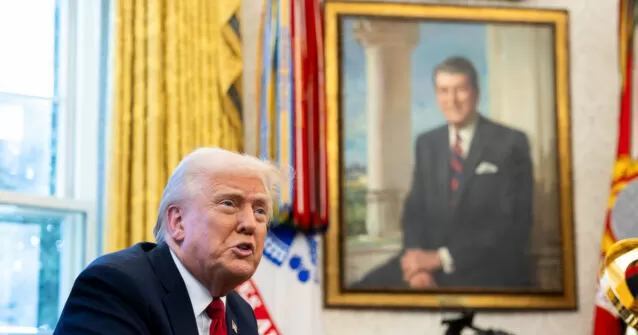In a recent announcement from the Oval Office, President Donald Trump disclosed plans to impose a 25% tariff on all cars not made in the United States. This move is aimed at boosting the American economy and protecting domestic car manufacturers.
In his statement, the President emphasized the importance of supporting American businesses and workers. He stated, “What we’re going to be doing is a 25 percent tariff on all cars not made in the U.S.” This decision is a bold step towards achieving self-sufficiency and promoting American-made products.
The tariffs will primarily affect imported cars from countries such as Japan, South Korea, Germany, and Mexico. The President believes that these tariffs will level the playing field for American car manufacturers and create more job opportunities for American workers. He also hopes that this move will reduce the trade deficit and boost the economy.
This decision has received mixed reactions from different groups, with some applauding the President’s efforts to support American businesses, while others express concerns about the potential consequences of this move. However, one thing is certain; this decision will have a significant impact on the automotive industry.
The President’s decision to impose tariffs on imported cars is not a new concept. In 2018, he imposed a 25% tariff on imported steel and a 10% tariff on aluminum, a move that was met with mixed reactions. However, the President believes that these tariffs have helped to revitalize the American steel and aluminum industries, resulting in the creation of more jobs and boosting the economy.
The automotive industry is a vital part of the American economy, with millions of jobs and a significant amount of revenue generated. By imposing tariffs on imported cars, the President aims to encourage Americans to purchase domestically produced cars, which will ultimately benefit the economy. This decision will also create a competitive environment for car manufacturers, leading to better quality and more affordable cars for American consumers.
Critics of the President’s decision argue that tariffs will lead to an increase in car prices, which will ultimately hurt American consumers. However, the President is confident that the tariffs will not have a significant impact on car prices and that the benefits far outweigh any potential negatives.
The President’s bold move has been praised by American car manufacturers who have been struggling to compete with their foreign counterparts due to cheaper labor costs and lower production costs. This decision will give them a fair chance to compete globally and help to keep jobs within the country.
In conclusion, President Trump’s announcement of a 25% tariff on imported cars is a significant step towards promoting American-made products and supporting domestic businesses. This decision will have a positive impact on the American economy, creating more job opportunities and reducing the trade deficit. While there may be some concerns about the potential consequences, the benefits of this move far outweigh any negatives. It is a bold and necessary step towards achieving self-sufficiency and promoting American interests.


